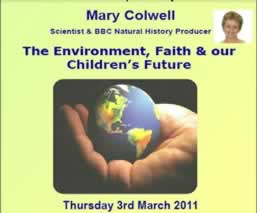The Environment, Faith and our Children’s Future |
||
The Bristol-based environmentalist and good friend of La Retraite, Mary Colwell, |
||
 |
This was the theme of a day organised by Galway’s Jesuit Centre for Spirituality & Culture last week with award-winning natural history producer, Mary Colwell. Mary spent the day in Coláiste Iognáid where she spoke to the 1 st and 5 th year students and a group of 6 th year biologists before speaking to parents and the general public in the evening. | |
| Beginning with an image of the earth from space, Mary contrasted the majestic, inky blackness of space with what astronaut Loren Acton described as the ‘w elcoming planet’, containing all that we hold dear and ‘good stuff’ of life. And yet at the same time, in the words of fellow astronaut, James Irwin, this ‘beautiful, warm, living object looked so fragile, so delicate, that if you touched it with a finger it would crumble and fall apart.’ This is our planet, a planet that sings out into space all the life force it contains, and this is our home! | ||
| Examples followed of some of the marvels of ‘our home’, from the intelligence of dolphins to the strange ‘orange roughy’ and other fish that live on the ocean floor that we know very little about, save that modern trawling methods are destroying their habitat and breeding cycles! The responsibility of each one in this interconnected world was made clear in an image of a dead albatross on a far away Pacific island, killed by swallowing the plastic bottle tops which it had mistaken as fish on the sea’s surface, and which when it tried to feed them to its chicks had killed them too. | ||
| However, whilst touching on the misuse of our natural resources, and here in Galway, particularly those from the sea, Mary’s talks did not dwell solely on the difficulties of our relationship with creation. Images followed of great wilderness areas and wonders of nature, images of such variety and infinite mystery that they could not fail to touch the soul and open us to a sense of the transcendent. In our interconnectedness we are indeed part of something much larger than ourselves. In the words of the teenager Anne Frank, looking out onto a tree from the confines of her attic bedroom: ‘The best remedy for those who are afraid, lonely or unhappy is to go outside, somewhere where they can be quiet, alone with the heavens, nature and God. Because only then does one feel that all is as it should be and that God wishes to see people happy, amidst the simple beauty of nature.’ | ||
To be fully human, to be happy as God wishes us to be is, Mary suggested a question of finding a balance in all our relationships: with God, with ourselves and with others and also in our hitherto neglected relationship with planet earth. There is theological work to be done here, not only with regard to the sharing of our world’s resources, and the discovery of a ‘theology of enough’ but also greater understanding of what it means if we say we are in relationship with each of God’s creatures. The albatross is a well-known species but what of other birds, like the ptarmigan, a small arctic bird most of us have never heard of, shall probably never see and who have no obvious links or use to us as human beings? How much do we care about the lives of the ptarmigan and other creatures, and how far are we willing to protect or consider ourselves in relationship with them? |
||
| Mary then shared her ‘wake-up call’ as regards the environment, and the talk she gave in Clifton Cathedral in 2005 entitled ‘The Pope and the Iceberg’. It is a matter of each one doing what they can but, she insisted, there is no one answer and what might happen with regard to the care for the environment in Galway is necessarily different to anything undertaken in her home city of Bristol. Still more importantly, the transformation of our attitudes and actions with regard to our planet will not come about because of guilt or coercion: we need to feel the passion of what the philosopher Eric Hoffer calls ‘an extravagant hope’. | ||
| Through her presentations, her enthusiasm, her questions and gentle challenges Mary Colwell gave us all in Galway what Col á iste Iogn á id’s principal Mary Joyce described as a truly memorable day, laying the foundations for some exciting work ahead in the school, and giving each of us ‘an extravagant hope’ for the future. | ||